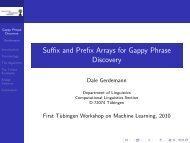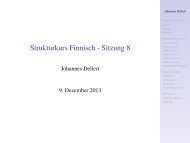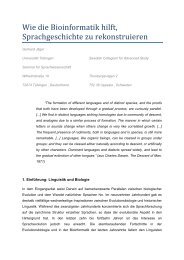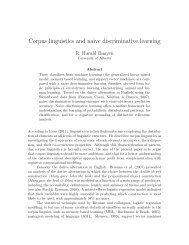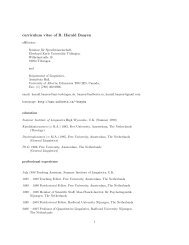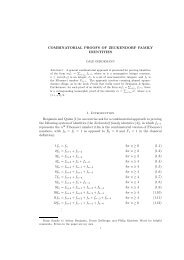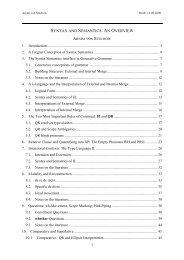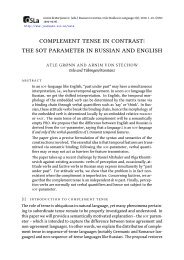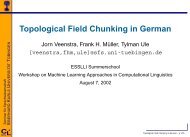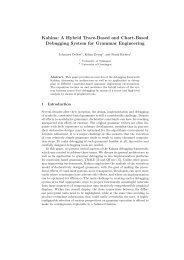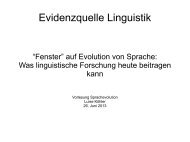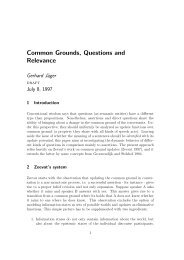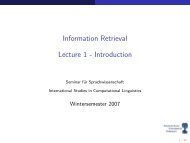A Treebank-based Investigation of IPP-triggering Verbs in Dutch
A Treebank-based Investigation of IPP-triggering Verbs in Dutch
A Treebank-based Investigation of IPP-triggering Verbs in Dutch
You also want an ePaper? Increase the reach of your titles
YUMPU automatically turns print PDFs into web optimized ePapers that Google loves.
to parse now does. The extra manual annotation effort <strong>in</strong> treebank update is relatively<br />
small when compared to the first round <strong>of</strong> annotation, typically requir<strong>in</strong>g<br />
one or two additional decisions for some 5–10% <strong>of</strong> the previously recorded correct<br />
analyses, and new annotation for previously rejected items, which were another<br />
15% <strong>of</strong> the total <strong>in</strong> the second round, and much less <strong>in</strong> successive rounds. Hence<br />
these later rounds <strong>of</strong> updat<strong>in</strong>g the treebank proceed more quickly than the <strong>in</strong>itial<br />
round <strong>of</strong> annotation.<br />
Correct<strong>in</strong>g errors <strong>of</strong> both classes <strong>based</strong> on analysis <strong>of</strong> the first pass through<br />
DeepBank annotation has resulted <strong>in</strong> a significant improvement <strong>in</strong> coverage and<br />
accuracy for the ERG over the WSJ corpus. Raw coverage has risen by some 10%<br />
from the first pass and the ‘survival’ rate <strong>of</strong> successfully treebanked sentences has<br />
risen even more dramatically to more than 80% <strong>of</strong> all sentences <strong>in</strong> the first 16<br />
sections <strong>of</strong> the WSJ that have now gone through two rounds <strong>of</strong> grammar/treebank<br />
updates. The table below shows the current status <strong>of</strong> these first 16 sections <strong>of</strong><br />
the English DeepBank <strong>in</strong> terms <strong>of</strong> “Observed” and “Verified” coverage, where the<br />
former reports the number <strong>of</strong> sentences that received at least one analysis from the<br />
ERG, and the latter gives the number <strong>of</strong> sentences for which the annotator recorded<br />
a correct analysis.<br />
Table 1: English DeepBank ERG results for WSJ Sections 00–15<br />
Section Number <strong>of</strong> items Observed coverage Verified coverage<br />
00 1922 92.2% 82.0%<br />
01 1997 92.3% 81.6%<br />
02 1996 92.3% 84.0%<br />
03 1482 92.0% 82.1%<br />
04 2269 92.6% 81.5%<br />
05 2137 92.3% 81.8%<br />
06 1835 91.3% 81.1%<br />
07 2166 91.9% 82.6%<br />
08 478 90.6% 80.1%<br />
09 2073 92.0% 81.2%<br />
10 1945 91.8% 81.3%<br />
11 2237 91.5% 80.4%<br />
12 2124 94.2% 85.1%<br />
13 2481 94.8% 85.8%<br />
14 2182 94.0% 86.0%<br />
15 2118 94.1% 86.4%<br />
Subtotal 31442 92.6% 82.6%<br />
These figures, which are surpris<strong>in</strong>gly stable across sections both <strong>in</strong> raw pars<strong>in</strong>g<br />
coverage and <strong>in</strong> treebanked items, show that roughly 18% <strong>of</strong> the sentences <strong>in</strong> the<br />
corpus fail to receive a correct analysis from the ERG; we discuss the DeepBank<br />
annotations for this portion <strong>of</strong> the corpus <strong>in</strong> section 4. Note that most <strong>of</strong> the rema<strong>in</strong><strong>in</strong>g<br />
portion <strong>of</strong> the WSJ corpus has now been treebanked the first time through,<br />
and we expect the rema<strong>in</strong><strong>in</strong>g updated sections to be completed by the end <strong>of</strong> the<br />
year, exclud<strong>in</strong>g three held-out sections reserved for future test<strong>in</strong>g.<br />
89



